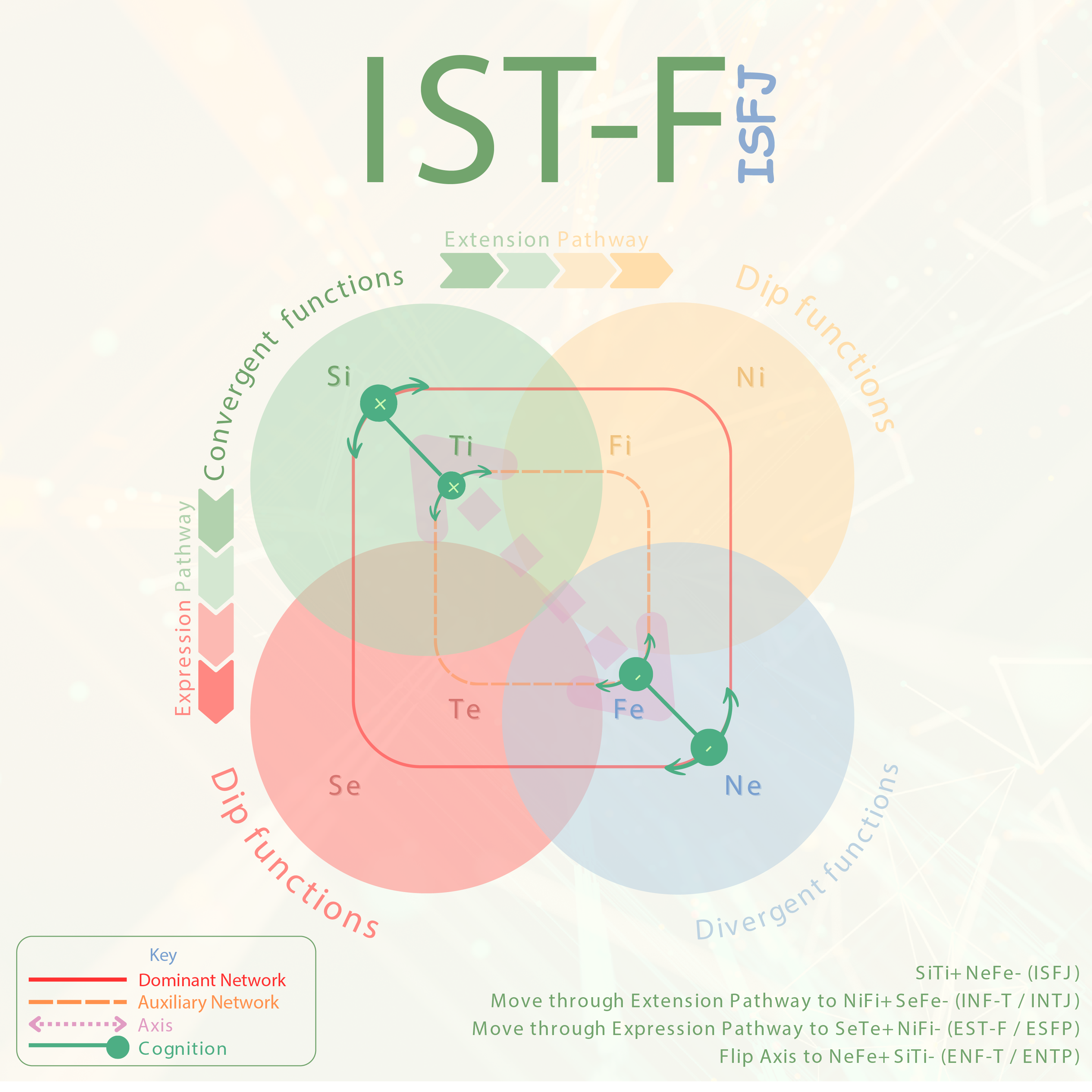
The ISFJ, also known as iST in Cognitive Personality Theory (CPT), is a meticulous and process-oriented type characterised by their dominant Introverted Sensing (Si), agency Introverted Thinking (Ti), authority Extraverted Feeling (Fe), and oppositional Extraverted Intuition (Ne). This combination makes for someone who explores and refines internal representations of reality within a theme (e.g., a sub-niche) rather than across themes, driven by a desire for peace and harmony.
Dominant Position: Introverted Sensing (Si)
As the dominant function, Introverted Sensing (Si) provides the ISFJ with a deep focus on internal representations and memories. This function excels at bringing a process into harmony with itself, ensuring a deep sense of internal fidelity and clarity. Si is expansive for new concrete, mathematical, and deterministic information, welcoming information that can refine the internal world.
How it Feels: For the ISFJ, Si dominance means having a rich and vivid internal landscape. They have a keen ability to distinguish the reliable from the unreliable and engage in formal logical processes, using logical stepping stones to create a stable and reliable internal framework. This focus on internal consistency allows them to feel grounded and certain about the processes they engage in.
Agency Position: Introverted Thinking (Ti)
In the agency position, Introverted Thinking (Ti) provides the ISFJ with the ability to assume total control of processes and definitions. Ti is fast-switching and can be resistant to new information, ensuring that the internal processes remain logically coherent and refined.
How it Feels: With Ti as their agency function, ISFJs can effectively manage and refine processes, ensuring everything runs smoothly and efficiently. They invest their ego in their ability to understand and control the underlying details if necessary, making them meticulous and precise in their approach. However, this can sometimes lead to reluctance in delegating tasks, as they may fear the onset of chaos if others do not meet their exacting standards. The Japanese term "粋" (pronounced "iki" or "sui") encapsulates the inherent elegance of TI in this position.
Authority Position: Extraverted Feeling (Fe)
Extraverted Feeling (Fe) in the authority position acts as a guiding force for the ISFJ, instilling an inherent nobility and self-restraint. Fe ensures that their actions are aligned with social harmony and the well-being of others, even if it means suppressing their own needs at times.
How it Feels: Fe in this position can feel like a moral obligation to maintain social harmony. The ISFJ may often find themselves acting in ways that support and uplift others, striving for a peaceful and cohesive environment. This function can also lead to feelings of resentment if their own needs are continually set aside in favour of others.
Oppositional Position: Extraverted Intuition (Ne)
In the oppositional position, Extraverted Intuition (Ne) serves as a delicate yet essential cognitive element. Ne provides the ISFJ with a cautious and expectant approach to the unexpected, ensuring orderliness by doubling down on deterministic processes that can be predicted.
How it Feels: Ne in the oppositional position often feels like a subtle, watchful presence that anticipates potential disruptions. While it can be a source of stress due to its sensitivity, it also provides valuable insights and predictions that help the ISFJ maintain stability and order. This function encourages them to be prepared for any surprises and to ensure their processes are robust and reliable.
Cognitive Dynamics and Dip Functions
The ISFJ’s cognitive dynamics are characterised by their ability to refine and maintain internal processes through Si-Ti. This type excels at bringing a process into harmony with itself, ensuring everything runs smoothly and efficiently.
Dips:
SiTi - NiFi: Extending the purity of internal representation and processes by relating the self to the collective it is a part of, seeing the self as an SiTi jigsaw piece within the larger NiFi collective. This dip helps the ISFJ understand their role within a larger context and how their meticulous approach contributes to the overall harmony of humanity.
SiTi - SeTe: Expressing the internal intensity of interests into the pursuit and exploration of these interests. This dip allows the ISFJ to channel their refined processes into practical and engaging activities.
NeFe - SeTe: Performance of skillsets in order to form a 'persona of competence' within their chosen roles. This dip helps the ISFJ showcase their abilities and gain recognition for their meticulous work.
Conclusion
The ISFJ (iST) is a natural at handling mathematical and process-heavy tasks, excelling at refining the connective tissue within a process to realise the purest distillation of connectivity. Their dominant Introverted Sensing (Si) drives them to create a vivid and reliable internal world, while their agency Introverted Thinking (Ti) ensures that their processes are meticulously managed.
The authority Extraverted Feeling (Fe) guides them towards social harmony, and the oppositional Extraverted Intuition (Ne) provides a cautious watchfulness that keeps everything in order. Together, these functions create a personality that excels in creating harmony within processes and ensuring that everything runs smoothly and efficiently from the ground-up.
Illustrations by Rivka B.